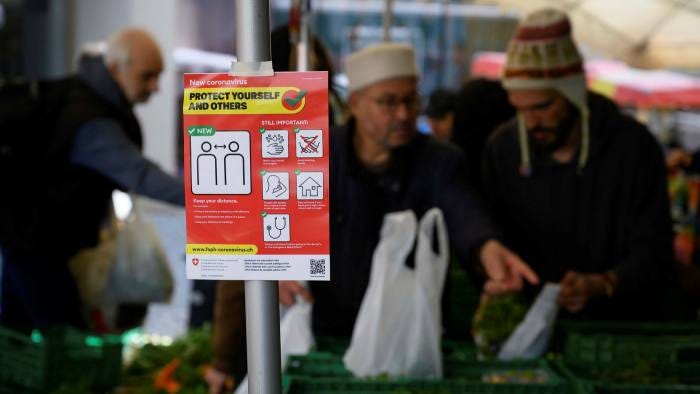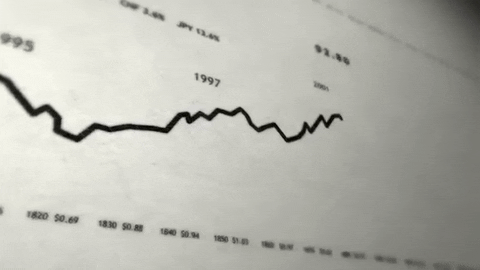
The storm is raging.
And it continues to rage, moving gradually west, stirring up panic and political debate, (not always of the logical variety) in its wake. The United States has now achieved the dubious distinction of becoming the country with the most coronavirus infections. The UK owns the honor of counting its political leader, Boris Johnson, among the infected.
The US economy is infected as well - with over Americans 3,3 million applying for unemployment in the last weeks alone.
In the meantime, Switzerland battles on.
The good fight seems to be, in some ways, working as Daniel Koch from the Bundesamt für Gesundheit recently confirmed: worst-case scenarios have (so far) not materialized.
The BAG also announced the latest numbers - the ones we all follow: over 13 000 infected and 257 deaths.
This relative success in perserving lives - particularly when compared to neighboring Italy - does not diminish the fact that the real war is being waged on an economic front.
Putting shackles on the Swiss economic machine in order to catch (and destroy) the invisible bug costs the country 15 billion CHF every month, according to estimates published this week in the Neue Zürcher Zeitung. Now the Bundestrat plans to step in and help mop up those losses, particularly a huge chunk of the 400 billion per year dedicated to paying the monthly salaries of Swiss workers.
Good for them.
With Health Minister Alain Berset indicating that the country-wide shutdown may need to continue into the middle of May, Bern will need to be prepared to roll with the proverbial punches.
And even as the numbers grow more stagering by the day, they point to one fact:
In this struggle, Switzerland is dressed and ready to die.
Not inside yet?
Sign up to get all insights from The Swiss Insider - every week.
Do it now.
👕 Dressed…
Doubters abounded at the beginning of the corona crisis.
Their main question, of course, being: can a country built on consensus and slow-moving bureaucracy react fast enough in such a critical situation?
The answer, suprisingly, is yes, it is.
The aid packages (yes, in the plural) announced over the last few weeks, have shown that for all the derision thrown their way, the seven men and women charged with running the country do, indeed, have the guts to pull out their bazookas when they need to. First indications seem to show, that the infrastructure behind those promises is working well.
The country is all dressed up and ready to roll.

Long-held crisis measures are also coming back in vogue. Because its supply chain relies heavily on imports (40-50% of all goods), Switzerland has long maintained strategic reserves of essential foodstuffs: 63 000 tonnes of sugar, 33 700 tonnes of cooking oil, 400 000 tonnes of dairy cattle feed…and…15 000 tonnes of coffee beans.
Yes - this is a country that will not get caught with its pants down.
And even as 20% of Swiss SMEs send their employees on furlough and a full one-sixth of them start to worry about bankruptcy, there is an overall sense that the country will pull through and continue to thrive - as it has always done.
But that confidence may play out somewhat differently than some businesses may have hoped.
Being at home (with or without a job) has suddenly forced many of us to come face-to-face with the fact that we simply do not need as much stuff as we have. When confronted with a smaller salary and increased difficulty in getting to a store (or getting an online order delivered), we suddenly come to the realization that we just don’t need to consume so much!
All well and good, but let’s be honest - the record bull-run of the last 12 years, and indeed the general improvement in the world at large since the end of World War II has been largely tied to rising living standards and rising consumption, both of home-grown products and cheap articles imported from overseas.
Many pundits point to changes in society resulting from the mass adoption of digital tools for work and pleasure - and commerce.
But what if the simplest result of corona is that people do more, with less?
⚰️ …and Ready to Die
But even with anti-crisis preparations all buttoned-up, it will be impossible to completely stop the bleeding. tough times call for tough measures…if they are generally uncomfortable.
The postponement of the 2020 Summer Olympics for instace, while tragic, was the only sensible step to take. Dreams of gold-medal glory are hard to come by and harder to let go, but sometimes they just have to die.
On a larger scale, it is unavoidable that some businesses will die.
The same can be said of some WAYS of doing business. We are not likely to see entire companies suddenly do away with their offices and build completely remote workforces.
But the paper-based, email-shy ways of many Swiss businesses will need to be rethought. Collaboration in the digital space will become the name of the game, whether people like it or not.
And why not - should inefficient business practices be allowed to flourish, just because we hold onto them with nastaligic obsession?
So far, we do not know if the Swiss economy is ready to accept this hard truth.
What it is apparently ready to accept is a slow death of civil liberties and privacy. In order to track the number of people adhering to the social distancing guidelines, Swisscom is using mobile data to keep an eye on the whereabouts of its customers.
(The national telecom has also kept its stores open during the crisis, by the way…)
Maybe such meaures are justified in these extraordinary times. And if successful, the death of some standards may just open up the possibilities of some new business models (think location-based advertising based on mobile data).
The fact that little, if any, fuss has been made about Swisscom’s move, proves again how willing the country’s citizens are to let some things die…
In the meantime, let’s hope that Swisscom can’t tell exactly how we are dressed.
It would be a shame to get caught in your pajamas…


The Numbers Game

All the numbers that matter in these troubled times…
👏🏻 2 500%
If one single item has been in more demand around Swiss shops these days, it is hand sanitizer. According to a data analyzed from shopping list app Bring!, purchases of the one essential ingredient deemed most valuable in preventing the spread of coronavirus in Switzerland has risen by 2 500%. No big surprise there…
What does catch the eye is a dramatic increase in the desire for chocolate (136%) and potting soil for planting flowers (560%). It would seem that many people plan on skipping their diets and working in the garden during the shutdown.
⏩ Share the numbers…
Give the gift of knowledge - share this edition of The Swiss Insider with a friend or colleague.
Make them smart - and yourself look even smarter.
🕕 30 minutes
Finance Minister Ueli Maurer promised last week that SMEs in need of immediate credit could get access to the cash they need inside of 30 minutes. While some entrepreneurs interviewed by 20Minuten, found that the process did last slightly longer, several reported receiving the transfer on their bank account the same day. Talk about Swiss efficiency…
📅 3 years
After record drops in stocks and panic selling on the bond and ETF markets, indices around the globe did a funny thing over the past week. They rallied. They did so in Switzerland as well, with an 7% jump on Tuesday. This brings things back to almost exactly the point they were - a mere 3 years ago when the Swiss Market Index cracked 8 000. Small world…
💸 20 francs
Twenty Swiss francs may not seem like too much. But that is exactly the amount that Swiss insurer Zurich was planning to dole out as a dividend to its shareholders. FINMA chief Mark Branson has another idea. After (seemingly) lobbying with success for major Swiss banks and financial institutions to suspend share buyback programs, Branson penned an opinion piece in the Neue Zürcher Zeigung, urging those same companies to hold off on dividend checks. So far he has been unconvincing…




